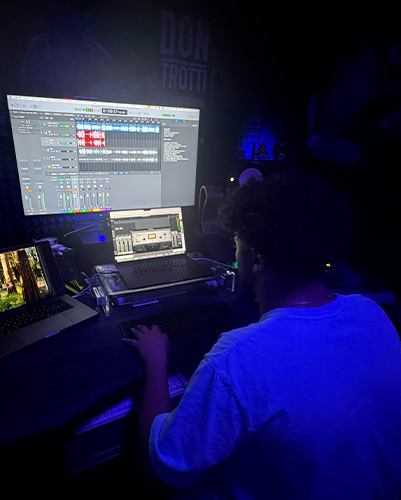Buzzy Papo
Buzzy Papo

Iscrizione : 2020 - Presente
Cittadinanza : Sierra Leone 🇸🇱
Basato a : Freetown, Sierra Leone 🇸🇱
Attivo nella musica dal : 2013
Tipo di musica : Afro, Hip-Hop & Dancehall
Etichetta : Swiss Gambia Association per Don Trotti Records
Mohamed F Sesay, comunemente noto come Buzzy Papo, è un artista sierraleonese di Hip Hop, Afrobeatz e Dancehall, nato il 18 novembre sull'isola di Plantain, nel distretto di Moyamba, in Sierra Leone.
Ha frequentato la scuola primaria SIC fino alla quinta classe sull'isola di Plantain, poi si è trasferito nella città di Rotifunk, distretto di Moyamba, dove ha continuato la sua istruzione presso la scuola primaria DEC, classe sei, e ha sostenuto gli esami NPSE. Successivamente, ha frequentato la WSMSS Rotifunk JSS 1 e si è trasferito a Freetown per proseguire i suoi studi alla scuola internazionale di missione della Sierra Leone a Wellington, dalla JSS 2 alla SSS 3, per poi trasferirsi alla BSS di Allen Town e sostenere gli esami WASSCE.
Il suo interesse per la musica è iniziato in giovane età ed è stato influenzato da molti grandi artisti mentre cresceva. Nel 2011, partecipava a battaglie di rap per strada tra scuole e club.
La carriera musicale di Buzzy Papo è iniziata ufficialmente nel 2013, quando ha formato un gruppo musicale chiamato Rotifunk Brother Hood (RBH) e ha lavorato su un album completo con il team. Ha collaborato con Rap G per creare una canzone di successo intitolata "Beautiful", ottenendo grande successo in Sierra Leone, ospite di tutte le principali stazioni radio di Freetown, tra cui Air Radio, Mercury Radio e Kallieon Radio, e ha partecipato a grandi eventi e spettacoli.
Nel 2019, si è trasferito a Banjul, in Gambia, per continuare la sua carriera musicale, rilasciando brani di successo come "Superstar Love" e collaborando con Supafire per "Party Na Ya", che ha raggiunto fama internazionale in Regno Unito, Svezia e gran parte dell'Africa, inclusi Gambia e Sierra Leone. Nel 2020, ha firmato con Mj Records e ha ottenuto importanti successi nell'industria dell'intrattenimento del Gambia, ospite di tutte le principali stazioni radio di Banjul, come Taxi FM, West Coast Radio, Paradise FM, Capital FM. La gestione ha organizzato un grande evento al Lamin Willis Night Club di Lamin e ha partecipato al più grande festival di Brikama il 31 dicembre 2020, insieme a grandi nomi come ST Gambia Dream e Hussan Dada.
Nel ottobre 2023, abbiamo rilasciato l'EP intitolato "Bando".
Nel maggio 2024, abbiamo rilasciato l'EP intitolato "Days & Nights".

EP : Bando
Tipo di musica: Afro, Hip-Hop & Dancehall
Registrazione : Don Trotti
Mixaggio e Mastering: DR A.M. & Don Trotti
Etichetta : Swiss Gambia Association per Don Trotti Records
🎶 Notizie entusiasmanti: Buzzy Papo della Sierra Leone lancia l'EP "Bando" in Gambia! 🎶
🌟 Preparati a ballare al ritmo delle affascinanti sonorità della sensazione della Sierra Leone, Buzzy Papo, con il suo nuovo EP, "Bando"! 🌟
🔥 Immergiti nei ritmi vibranti, nelle melodie soul e nello stile inconfondibile di Buzzy Papo che sta conquistando il mondo della musica! 🔥
🌍 Dalla Sierra Leone al Gambia, "Bando" è un viaggio musicale che supera i confini e i generi, offrendo un'esperienza indimenticabile per gli appassionati di musica di tutto il mondo.
📢 Ma non è tutto! Abbiamo una sorpresa per i tuoi occhi e le tue orecchie. Dai un'occhiata a un'anteprima dell'EP con un emozionante video su YouTube: Guarda il teaser di "Bando".
✨ E indovina un po'? Presto, "Bando" sarà disponibile sulle tue piattaforme di streaming preferite. Resta sintonizzato per vivere l'esperienza musicale definitiva!
Aiutaci a diffondere la notizia di questo straordinario viaggio musicale. Condividi questo post, tagga i tuoi amici e fai sapere a tutti che "Bando" di Buzzy Papo è l'EP perfetto per arricchire la tua playlist! 🌍🎵
Celebriamo insieme l'unità della musica e della cultura con "Bando". 🕺💃 Unisciti a noi nel rendere questo EP un successo internazionale! 🎉















